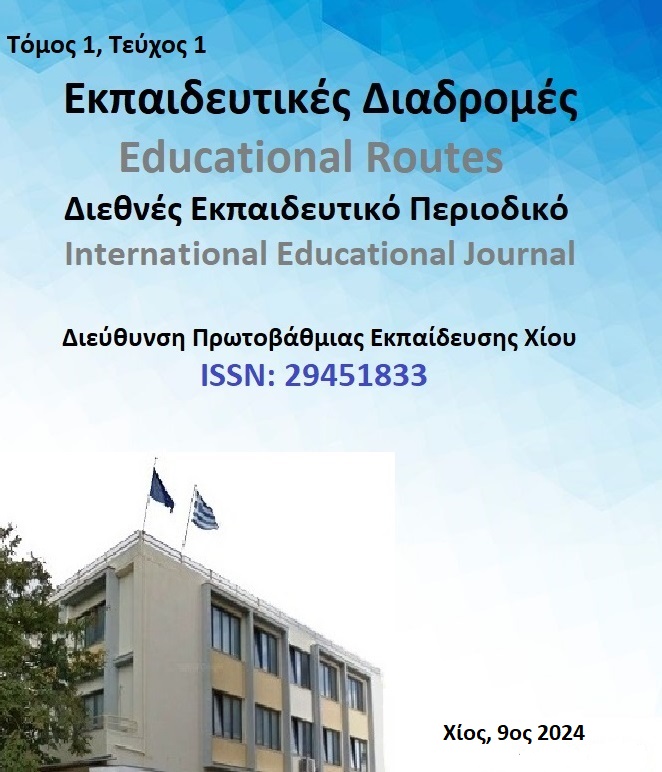Η επαγγελματική ταυτότητα του/της εκπαιδευτή/τριας της σύγχρονης ευάλωτης ετερότητας: δομικά στοιχεία, διαμόρφωση και ιδιαιτερότητες
Abstract
Η επαγγελματική ταυτότητα των εκπαιδευτ(ικ)ών, και ιδιαίτερα όσων εργάζονται με ενήλικα μέλη ευπαθών κοινωνικών ομάδων, είναι μία διαρκώς εξελισσόμενη, ενεργητική και συνεχής διαδικασία, η οποία επηρεάζεται από τα προσωπικά και επαγγελματικά χαρακτηριστικά τους, καθώς και τις κοινωνικές, ιστορικές και πολιτισμικές συνθήκες όπου ζουν. Στη χώρα μας, δεν υπάρχουν εμπειρικά δεδομένα για τον τρόπο διαμόρφωσης της επαγγελματικής ταυτότητας των εκπαιδευτών/ριών ευπαθών κοινωνικών ομάδων και για τα δομικά της χαρακτηριστικά. Προκειμένου να διερευνηθούν τα παραπάνω, διεξήχθησαν συνεντεύξεις με 12 εκπαιδευτές/τριες, οι οποίες αναλύθηκαν με τη μέθοδο της Θεματικής Ανάλυσης. Τα αποτελέσματα έδειξαν ότι η επαγγελματική ταυτότητα των εν λόγω εκπαιδευτών/τριών αποτελείται από τέσσερα δομικά στοιχεία: (α) Τα κίνητρα να ασχοληθούν με την εκπαίδευση ευπαθών κοινωνικών ομάδων που πηγάζουν από την εσωτερική τους ανάγκη να παρέχουν βοήθεια σε κάθε άτομο που το έχει ανάγκη. (β) Την αυτό-αποτελεσματικότητά τους που επιτυγχάνεται όταν υπάρχει αποδοχή και σεβασμός στη διαφορετικότητα των εκπαιδευόμενών τους, ενσυναίσθηση, ευελιξία, ανοιχτή επικοινωνία με τους/τις εκπαιδευόμενους/ες και, τέλος, κατανόηση των ιδιαίτερων εκπαιδευτικών και κοινωνικών αναγκών τους. (γ) Η ανάληψη ευθυνών και η αίσθηση καθήκοντος απέναντι στην εκπαίδευση των ευπαθών κοινωνικών ομάδων ως αντιστάθμισμα της έλλειψης σχετικών προγραμμάτων από τους αρμόδιους φορείς. (δ) Τη δέσμευσή τους στην εκπαίδευση ευπαθών κοινωνικών ομάδων, όπως καταδεικνύει η επιμονή τους να παραμένουν στον χώρο, παρά τα εμπόδια και τις δυσκολίες. Τα ευρήματα αυτά συμφωνούν με αντίστοιχες διεθνείς έρευνες στη διαπολιτισμική εκπαίδευση και τη σύγχρονη ευάλωτη ετερότητα και μπορούν να χρησιμοποιηθούν για την παραγωγή γνώσης στην εκπαίδευση ενηλίκων μελών ευπαθών κοινωνικών ομάδων και τη δημιουργία κατάλληλων εκπαιδευτικών παρεμβάσεων.
##plugins.themes.ekt-hometheme.article.details##
- Sezione
- Πρωτότυπα Επιστημονικά Άρθρα

Questo lavoro è fornito con la licenza Creative Commons Attribuzione - Non commerciale - Non opere derivate 4.0 Internazionale.
Το έργο αυτό διατίθεται με άδεια Creative Commons
Αναφορά Δημιουργού - Μη Εμπορική Χρήση - Όχι Παράγωγα Έργα 4.0 Διεθνές
Προκειμένου να δείτε αντίγραφο της άδειας επισκεφθείτε:



